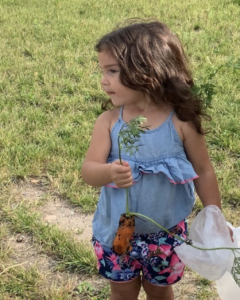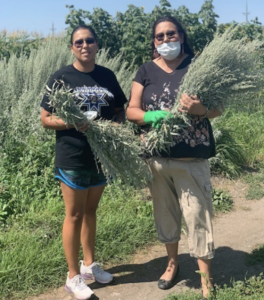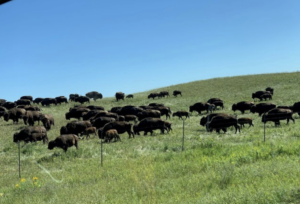Head Start programs were launched in 34 American Indian and Alaska Native (AIAN) communities in the summer of 1965. Today, AIAN Head Start and Early Head Start tribal programs proudly serve over 20,000 children in 26 states. And all of these programs know the importance of centering native heritage, languages, and cultures in their daily work.
Why is Representation in Early Childhood so Important?

The Head Start children loved getting their hands dirty in the warm soil, eating sun-soaked cherry tomatoes, and digging for buried treasure in the potato patch. They were excited to take the produce home to their families.
What infants and toddlers observe and learn from others and the environment shape how they think and behave. Their interactions with the world also forms and informs their self-image and sense of identity. This makes languages and cultural heritages important components of young children’s school readiness.
Of the 574 federally recognized tribes, 167 receive funding to operate AIAN programs. In these programs, 70% of teaching staff in AIAN programs are American Indian or Alaska Native and 11% are proficient in an AIAN language.
Children’s oral language and early literacy development serve as the foundation for later reading abilities and overall academic success. Evidence indicates that participation in high-quality preschools can improve children’s social, language, reading, and mathematical skills as well as reduce the achievement gap for linguistic and ethnic minorities.
Centering Native Heritage in Practice
Cankdeska Cikana Community College Head Start is an example of how a community garden can be an opportunity to center Native heritage in an early childhood setting.
One of Head Start’s successful initiatives is the GroMoreGood garden grant, through which all Head Start programs have access to garden resources, training, and curriculum. Garden projects become a source of fresh produce, a communal green space, and a learning environment for young children and their families.
After receiving the GroMoreGood garden grant in 2019, the Cankdeska Cikana Community College Head Start garden survived the COVID-19 pandemic and brought the community closer–even while socially distanced. Community members planted a raised bed with cherry tomatoes and carrots. Two- and three-year-old Head Start children helped to harvest the fresh vegetables.
“They called them treasures!” said Gabriele Krantz-Nelson, the community garden manager.

Head Start employees harvesting sage from the garden.
To preserve Native American traditions, knowledge, and cultural practices, the community grew sage in the garden. Sage is a sacred element of many AIAN cultures, typically used in native rituals. Tribal College President Cynthia Lindquist participated in the sage harvesting event at the community garden. She spoke about how sage is essential in smudging and making head, wrist, and ankle wreaths for the sun dance ceremony. Community members joined in with expressions of gratitude and prayers.
“The Cankdeska Cikana Community College grant program, staff, and students are doing amazing work to provide access and understanding to traditional knowledge,” said Lindquist.
Intergenerational Connections Preserve Native Heritage and Family History
The garden attracts different generations and creates a unique place for connection and collaboration between children, their parents and grandparents. One of the families contributing to the garden consisted of three generations. They told Krantz-Nelson that the grandparents had a big garden that had enough vegetables to cover the entire family’s winter needs. They appreciated the reminder of their history and expressed gratitude for family unity.
This project offers something for everyone. The adults gather on Saturdays to chat with each other while watching children on the playground. Hands-on experiences are valuable for children’s growth and gardening is a fun way to introduce positive social integration. The sense of community built around this garden turned it into a refuge from the pandemic’s aftermath and daily stressors.
Moving Forward

Spirit Lake tribe’s buffalo herd gave up a portion of their pasture for the community gardens! “All vines, cornstalks and excess produce were gathered and given to the TaTonka (buffalo) as a special treat.” – Gabriele Krantz-Nelson
The community garden project has successfully brought different generations together. Likewise, it continues to create opportunities to celebrate native heritage, traditions, and cultures. The excess produce is sold to the community in mobile farmer markets. Parents interested in selling their own produce join these markets, too. The project staff is planning to add SNAP benefits and invite more AIAN artisans to sell their crafts moving forward.
Today, Head Start serves around 44,000 children of AIAN heritage, both in AIAN and non-tribal programs nationwide. Based on the needs of local communities, programs everywhere will continue to offer traditional language and cultural practices to provide high-quality services to young children and their families while honoring and preserving their identity and heritage.
Related Content
